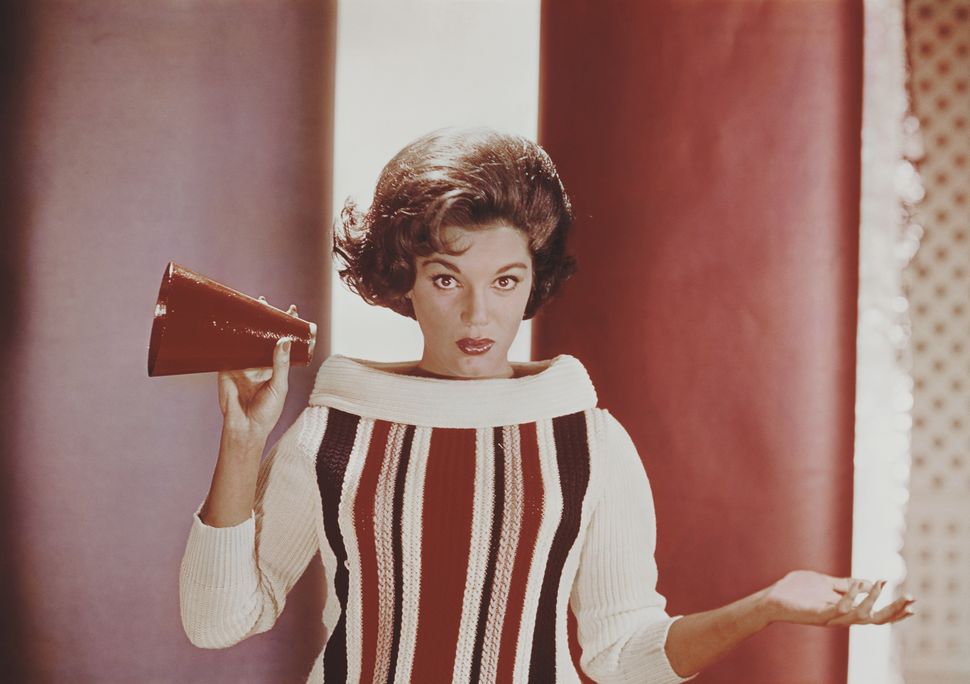The Secret Jewish History Of Connie Francis

Connie Francis Image by Getty Images
Last April, Stereogum – an online indie music magazine — referred to Connie Francis as “a Jewish singer from New Jersey who came up working with Brill Building songwriters.”
They got it half-right, anyway.
Francis, who turns 80 on December 12, was born Concetta Rosa Maria Franconero to solidly Italian-American parents in Newark. Early in her singing career, she did, however, work with the Jewish-American Brill Building songwriting team of Neil Sedaka and Howard Greenfield, who wrote her 1958 Top 20 hit, “Stupid Cupid.” And Francis did put in considerable time working in front of primarily Jewish audiences at resorts in the Catskills, including Grossinger’s and the Concord.
After her initial stint as a commercially successful pop singer in the strange interval period between the initial explosion of rock ‘n’ roll in the mid-1950s and the revival of rock fostered by the Beatles-led British Invasion in the mid-1960s, Francis turned her attention to recording ethnic music, including albums of Italian, German, and Irish favorites.
Among these albums was the 1960 release, “Connie Francis Sings Jewish Favorites,” on which Francis sang a dozen songs in Yiddish and Hebrew, including “My Yiddishe Momme,” Joseph Rumshinsky’s “Sheyn vi di Levone,” Alexander Olshanetsky’s “(Mayn Shtetele) Belz,” and Mark Warshawsky’s “Oyfn Pripetshik.”
Francis’s facility with Yiddish has been variously attributed to her time spent in the Catskills and her upbringing in a heavily Italian-Jewish neighborhood. She once told an interviewer, “I was brought up in Newark…. If you weren’t Jewish, you needed a password to get in. Also, I read Leo Rosten’s book, ‘The Joys of Yiddish.’”
Francis began her entertainment career as a star on children’s TV variety shows, including “Startime Kids” and “Arthur Godfrey’s Talent Scouts.” It was Godfrey who renamed Concetta Franconero “Connie Francis.” By 1955, she began her recording career with the help of George Scheck, who would become her longtime manager. Along with music publisher Lou Levy, Scheck — the father of O.J. Simpson’s lawyer Barry Scheck, cofounder of the Innocence Project — raised the $6,000 needed for Connie’s first recording session.
It took a while for any of Francis’s recordings to catch on, and MGM Records was about to cancel her contract when, against her wishes, she finally acceded to her father’s insistence and recorded the 1923 song, “Who’s Sorry Now,” with lyrics by the Jewish team of Bert Kalmar and Harry Ruby. Just as she was getting ready to give upon her recording career and go to college, she had a huge hit on her hands. “Who’s Sorry Now” went to number five in the U.S. and hit number one in the U.K. It spent 22 weeks on Billboard’s Hot 100 chart and launched Francis into the pop stratosphere. In 1958, all the trade magazines named Francis the number-one female vocalist, as they would for the next six years. According to her website, she was the top-selling female vocalist of the 1960s and is “the most commercially successful female singer of all time, with an estimated worldwide sales figure well in excess of two hundred million.”
For many years, Francis’s version of “Hava Nagila” was a staple of her live set, in an arrangement paired with the musical theme to the film “Exodus.” She appeared in the 2012 documentary film, “Hava Nagila: The Movie,” directed by Roberta Grossman, alongside other entertainers including Harry Belafonte, Glen Campbell, Leonard Nimoy, Regina Spektor, and the Klezmatics.
Francis’s life and career have been marred by tragedy. In 1974, she was the victim of sexual assault following a concert at Westbury Music Fair on Long Island. A botched surgery robbed her of her voice for several years in the late-1970s, and her brother, to whom she was devoted, was killed in a mob-style hit in 1981. She was involuntarily institutionalized in psychiatric hospitals over a dozen times in the 1980s but made a comeback of sorts in the 1990s and early 21st century with an autobiography and through performing charitable work with veterans and victims of violent crimes.
Perhaps Stereogum isn’t totally to be faulted for assuming Francis is Jewish. Apparently, Francis had to field the question about whether or not she is Jewish so often during her career that she came up with this stock answer: “I’m one-tenth Jewish on my manager’s side.”
Seth Rogovoy is a contributing editor at the Forward. He is the author of “Bob Dylan: Prophet Mystic Poet” (Scribner, 2009) and is writing a biography of George Harrison.





















